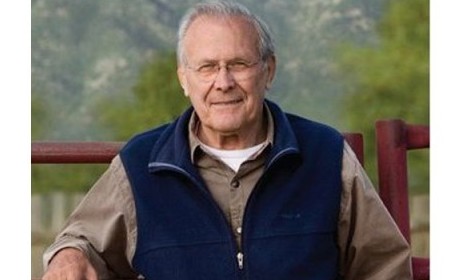Donald Rumsfeld's 'unapologetic' memoir: 5 key revelations
The former Defense Secretary's autobiography is due out next week, but some critics are already finding fault with its assertions

A free daily email with the biggest news stories of the day – and the best features from TheWeek.com
You are now subscribed
Your newsletter sign-up was successful
After years of being blamed for errors in the Iraq War, Donald Rumsfeld will tell his own side of the story in his soon-to-be published memoir. Critics who've reviewed Known and Unknown, the 800-page tome due in bookstores next week, say "Rummy" remains "largely unapologetic." Rumsfeld strikes a "characteristically tough and defiant" tone in the autobiography, says Bradley Graham at The Washington Post, and remains "unrepentant" about the overall handling of the war. Here, five key revelations:
Planning for Iraq began in November 2001
Bush asked Rumsfeld "where do we stand on the Iraq planning" on November 21, 2001, just two months after the attacks of September 11 — before U.S. troops even invaded Afghanistan. "It's the latest confirmation," says Howard Kurtz in The Daily Beast, "that war — or at least serious war planning — was gearing up long before the public was clued in and despite the absence of any link between Saddam and the terrorist attacks."
The Week
Escape your echo chamber. Get the facts behind the news, plus analysis from multiple perspectives.

Sign up for The Week's Free Newsletters
From our morning news briefing to a weekly Good News Newsletter, get the best of The Week delivered directly to your inbox.
From our morning news briefing to a weekly Good News Newsletter, get the best of The Week delivered directly to your inbox.
Rumsfeld has no regrets on Iraq...
The Middle East would be "far more perilous than it is today" if Saddam Hussein were still in power, writes Rumsfeld. While he concedes that "there may have been times when more troops could have helped" in the disastrous follow-up to the invasion, he claims no U.S. commander asked him for more soldiers.
... but wishes he had quit after Abu Ghraib
While Rumsfeld defends the controversial interrogation techniques used by the Army during the war, he regrets not quitting after the Abu Ghraib detainee abuse scandal. Abu Ghraib became a "damaging distraction," he writes, fueled by "partisan critics of the war and the president." He wrote Bush two letters of resignation, but neither was accepted. Regret is one thing, says Pratap Chatterjee at The Guardian, but the citizens of the U.S. and Iraq are still waiting for Rumsfeld to "apologize for the crimes of that war." That no apology is imminent is "rich, but not surprising."
A free daily email with the biggest news stories of the day – and the best features from TheWeek.com
He settles scores with his Republican enemies...
Rumsfeld "devotes a lot of space to rewaging various long-forgotten bureaucratic disputes," says Alex Pareene at Salon. These include setting the record straight on fallings-out with Colin Powell, Condoleezza Rice, George H.W. Bush, Deputy Secretary of State Richard Armitage, and Sen. John McCain, whom he says has a "propensity to shift his positions to appeal to the media." McCain, for one, has struck back: "Thank God he was relieved of his duties," the Arizona senator told ABC News. "Otherwise, we would have had a disastrous defeat in Iraq."
... and even criticizes George W. Bush
Though Rumsfeld is careful to call Bush a "formidable president," he is critical of 43's leadership — particularly, his inability to resolve feuds between the Pentagon and the State Department. Bush allowed Paul Bremer, U.S. Administrator to Iraq, to steer the post-invasion recovery, says Rumsfeld, and should have given less credence to the State Department in general. "There were far too many hands on the steering wheel," he writes. That "was a formula for running the truck into a ditch."